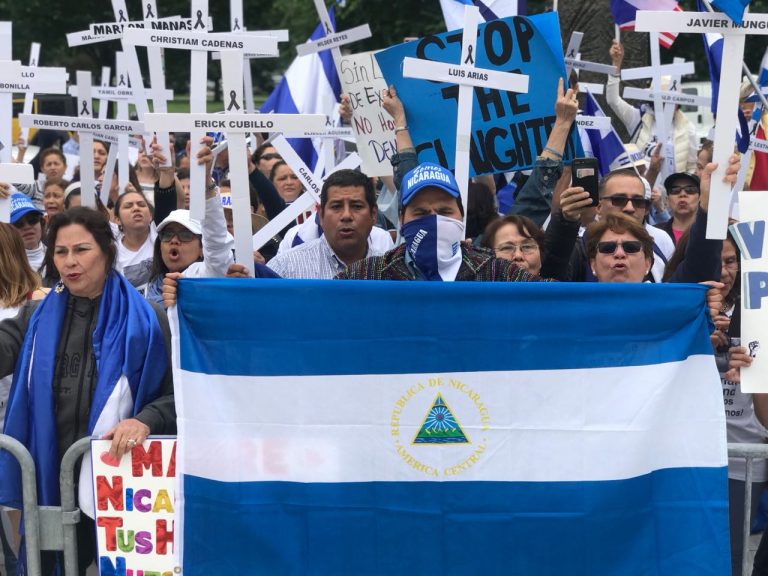12 de diciembre 2018

Ortega Grants Chinese Company a Huge Mining Concession

PUBLICIDAD 1M
PUBLICIDAD 4D
PUBLICIDAD 5D
The legislation conditions loans to the Government from multilateral entities and will impose individual sanctions to the regime higher-ups.

The United States Congress finally approved the Nica Act on December 11th, which establishes harsh political and economic sanctions against the regime of Daniel Ortega and Rosario Murillo. With approval in the lower house, the bipartisan bill, approved unanimously by Democrats and Republicans, concludes its journey through the pipeline of the US legislature, and will arrive at Donald Trump's desk where he is expected to sign it within the allotted ten business days.
The new law is a merger of the Nica Act proposed and driven by Congresswoman Ileana Ros-Lehtinen, an amendment by Republican Senator Ted Cruz and another by Democrat Bob Menendez. In addition, the bill that reaches Trump's hands includes an amendment by Marco Rubio directed against the regime's accomplices and associates. The approved law is also known as "Magnitsky Nica" and is officially called the Human Rights and Anticorruption Law of Nicaragua S. 3233.
The legislation imposes both individual sanctions for regime officials and the conditioning of loans to the Ortega regime by international financial institutions, such as the International Monetary Fund (IMF), the World Bank (WB), and the Inter-American Development Bank ( IDB).
The application of the law will have severe consequences for financing the public investment program of the government and will affect the national economy, while its promoters intend to pressure the Government to cease the repression and negotiate political reforms and early elections.
"I thank my colleagues in the House of Representatives and the Senate for passing the NICA Law that will help Nicaraguans free themselves from Ortega's despotic control," said Ros-Lehtinen, the original bill's promoter. "I am especially grateful to Bob, Ted, Marco, Patrick, Eliot and Albio who joined me in this effort from the beginning, as we witnessed the increase in corruption and repression by Ortega for many years."
According to the republican congresswoman, with the final approval of the amended law, Congress took a leap forward "to hold Ortega and his puppets responsible for the abuses committed." "In a desperate effort to hold on to power, Ortega and his thugs have continued to suppress freedom of expression and peaceful demonstrations. The United States has responded to the call of the Nicaraguan people and will continue to do so in support of the necessary electoral and human rights reforms," said Ros-Lehtinen.
The approved text states that the "Secretary of the Treasury instructs the executive director of the United States sitting on each international financial institution of the World Bank Group to use the voice, vote and the influence of the United States to oppose the International Financial Corporation approving any loan or financial credit or technical assistance to the Government of Nicaragua or any entity for a project in Nicaragua."
In its preamble, law S. 3233 states that the best solution for the sociopolitical crisis that Nicaragua is going through is a dialogue between the opposition sectors and the government, always mediated by the bishops of the Catholic Church.
The law calls for early elections with credible electoral observation. It states that any solution to the crisis must include the cessation of police and paramilitary repression, and the investigation of the murders committed since April, when the protests against the Ortega-Murillo regime broke out.
Report back with 180 days mandated
The new law establishes that the president of the United States may sanction any official or ex-official of the Ortega-Murillo government after determining whether he/she is "responsible or complicit or responsible for ordering, controlling or, otherwise, organizing or knowingly participating, directly or indirectly "in violations of human rights, acts of corruption, undermining of democratic institutions, expropriation of public or private property, and the illegal arrest or prosecution of citizens.
The sanctions include blocking assets that "are in the United States, enter the United States or are within the possession or control of a person from the United States." In addition, it establishes the cancellation of visas, measures that Washington has already been exercising over Managua through other legal mechanisms.
The law stipulates that within a period of 180 days after its approval, the Secretary of State, acting through the Under Secretary of State for Intelligence and Research, and in coordination with the Secretary of the Treasury and the Director of National Intelligence of the United States, will submit to the corresponding congressional committees a report on the participation of senior officials of the Nicaraguan government, including members of the Supreme Electoral Council, the National Assembly and the judicial system, in human rights violations, acts of significant corruption and money laundering; and persons who transfer, or facilitate the transfer of, goods or technologies for use in or with respect to Nicaragua, which "are used by the Nicaraguan government to commit serious human rights violations against the people of Nicaragua."
The Nica Act also mandates the Secretary of State to present, 180 days after approval, reports to the legislative committees to evaluate whether the law is having an effect. After that review process will be done annually.
However, the law still leaves open a semi-open door to the Ortega-Murillo government: "If the Secretary certifies to the corresponding congressional committees that the Government of Nicaragua is taking effective measures, the President may waive the application of the restrictions and sanctions for a period of no more than one year from the date of certification."
Archivado como:
PUBLICIDAD 3M
Periodista. Destaca en cobertura a violaciones de derechos humanos: desplazamiento forzado, tráfico ilegal en territorios indígenas, medio ambiente, conflictos mineros y ejecuciones extrajudiciales. Premio Iberoamericano Rey de España 2018.
PUBLICIDAD 3D